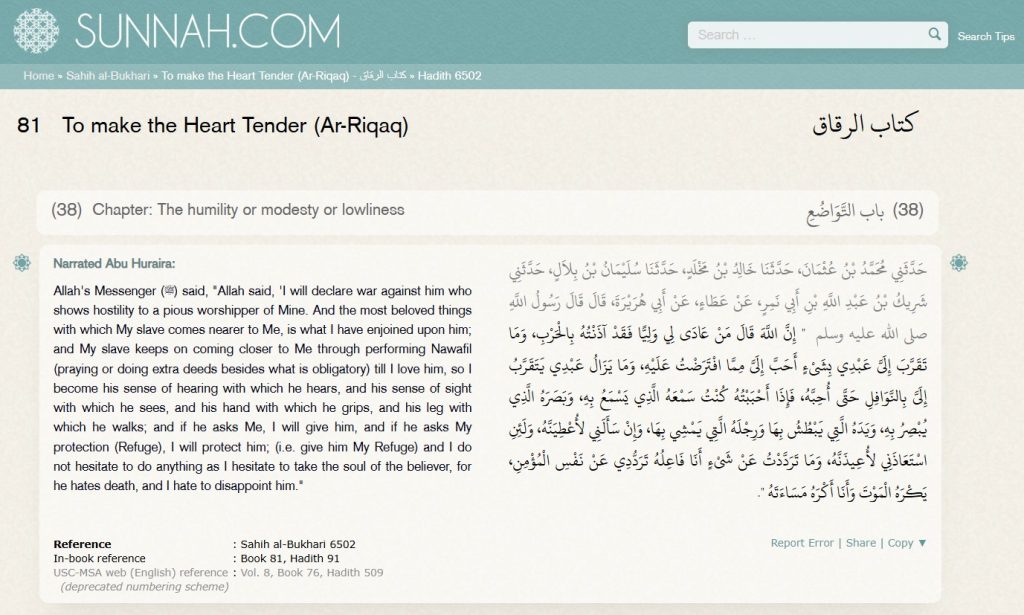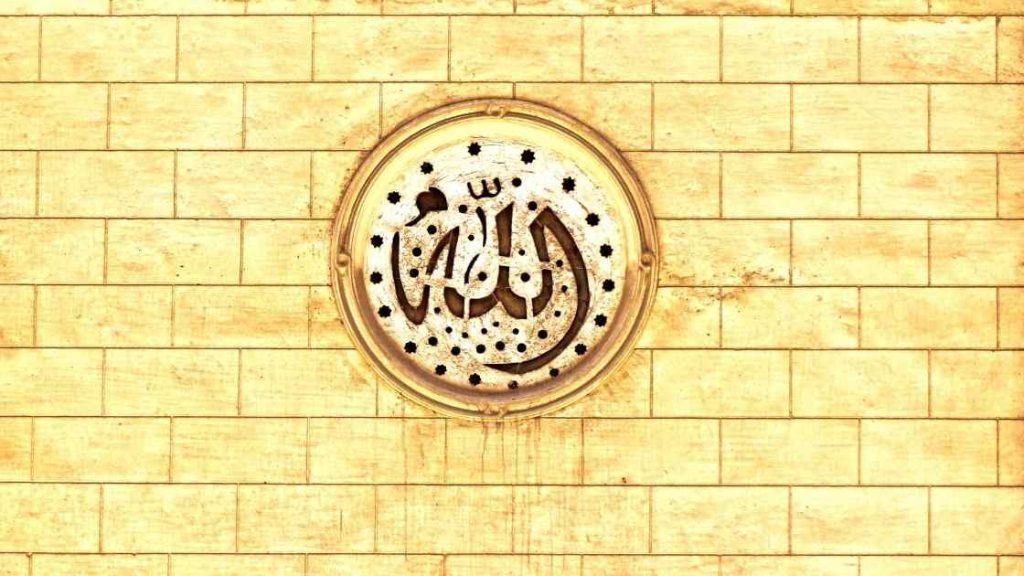Table of Contents
Introduction to Harming the Servants of Allah
Allah loves His righteous servants and protects them in every situation. His special protection is granted to His awliyah, the most righteous servants. The Hadith mentioned below warns those who try to harm His awliyah
The origin of wilayah is closeness to Allah and the enmity is being far away from the path of Allah. Based on this, the awliya’ of Allah are those who are obedient and perform the good deeds which make them closer to Allah. The enemies of Allah, on the other hand, are those who are evil doers. Their ill deeds distance themselves away from Allah and this will make them far from Allah’s blessing, support, and love.
The following discussion makes it clear that trying to harm the awliyah invites Allah’s wrath. People should stay away from harming the righteous servants of Allah.

Qur’anic verses about Harming the Servants of Allah
“And those who annoy believing men and women undeservedly, bear (on themselves) a calumny and a glaring sin.” (Al-Ahzab: 58)
“And lower thy wing to the believers who follow thee.” (Ash-Shu’ara’: 216)
Ahadith about Harming the Servants of Allah
Abu Hurairah (may Allah be pleased with him) said, “The Messenger of Allah (pbuh) said, “Allah said (in a Qudsi hadith), “He who is hostile to a friend of Mine, I declare war against. In another narration, “Then I apprise him with a war.” (Bukhari:6502)
Abu Hurairah, radiyallahu ‘anhu, reported that the Messenger of Allah, sallallahu ‘alayhi wasallam, said:
“Allah the Almighty has said: ‘Whosoever acts with enmity towards a closer servant of Mine (wali), I will indeed declare war against him. Nothing endears My servant to Me than doing of what I have made obligatory upon him to do. And My servant continues to draw nearer to Me with supererogatory (nawafil) prayers so that I shall love him. When I love him, I shall be his hearing with which he shall hear, his sight with which he shall see, his hands with which he shall hold, and his feet with which he shall walk. And if he asks (something) of Me, I shall surely give it to him, and if he takes refuge in Me, I shall certainly grant him it.’” [Al-Bukhari]

The status of the Wali
The translation of the term wali that is mentioned in the hadith is a closer servant (awliya’) of Allah or a believer rather than a closer friend. There are many verses in the Qur’an that talk about the concept of wilayah. These verses talk about the qualities or attributes of awliya’ and their status in the sight of Allah. In this hadith Allah mentions the status of the wali even before He talks about His attributes.
This status is mentioned in the beginning (i.e. Allah will declare war against whoever acts with enmity towards one of His closer servants) and in the end (i.e. Allah will answer their du’a and will give them refuge). This shows the status of awliya’ in the sight of Allah. In the middle of the hadith, Allah tells us the qualities of His closer servants. This article is about Harming the Servants of Allah.
The hadith also tells us that Allah loves those who are the closer servants to Allah. This is a natural result of what they do. Allah tells us about their actions upon which they deserved to be loved by Allah. We will see that there are two levels of servants of Allah: The first level is those who fulfill the obligations and avoid the prohibitions (muharramat). The second level is those who not only do this but also perform the preferable acts (nawafil).

Allah accepts the Du’aa of the Wali
“And if he asks Me, I will give him and if he seeks refuge in Me, I will grant him refuge.”
The hadeeth states and affirms the acceptance of the Wali’s Du’aa. Many amongst the companions have acquired this Bounty and Virtue, such as al-Baraa’, Ibn Malik, Al-Baraa’ ibn Azib, Saad ibn Abi Waqqas and Sa’id ibn Zayd (radhi allahu anhum).
Jaabir ibn Samurah said: “The people in al-Kufah complained to Caliph Umar (radiyallahu anhu) about Saad ibn Abi Waqqas (radiyallahu anhu), (who was their appointed governor), and Umar chose Ammar as their new governor. Their complaint about Saad included the claim that he does not know how to pray! Umar summoned Saad and said: “O Abu ish’aq! These people claimed that you do not know how to pray.”
He said: “By Allah! I used to pray with them in the manner the Messenger of Allah (sallallahu alaihe wa-sallam) used to pray, without alteration. When I would pray al-Isha, I would lengthen the first two and shorten the last two”
Umar (radiyallahu anhu) then said: “This is what we thought you would do, O Abu Ish’aq!” Umar then sent with Saad a man or several people to al-Kufah, and they did not exclude any Masjid from asking them about Saad, and they all said good words about him.
Then they entered a Masjid for the tribe of Abs, and a man form amongst them, called Usamah ibn Qatadah, abu Sa’dah, stood up, saying: “Since you have asked us, Saad never went himself with the army, nor was he dividing (from the booty) with fairness, not did he judge with fairness.”
Saad said: “By Allah! I will ask Allah for three: “O Allah! If this slave of yours is telling the lie and only stood up for Riyaa and Sumah (showing off), then lengthen his time (make him live long), prolong his poverty, and expose him to Fitan (trials in life and religion). And so did happen…” [Bukhari and Muslim]
Also, Urwah ibn Az-Zubayr said that Said ibn Amr ibn Naufal (radiyallahu anhu) once had a dispute with Arwa bint Aws before Marwan ibn Al-Hakam. She claimed that he took over some of her land.
Sa’id then said: “How can I take some of her land after I have heard form the Messenger of Allah (sallallahu alaihe wa-sallam): “He who takes a hand-span of land (illegally) it will be tied to him to the seventh of earth.”
Marwan then said: “I will not ask you to present more than this proof (meaning since you will not lie after you have heard from Prophet (sallallahu alaihe wa-sallam).
Amr ibn Naufal (radiyallahu anhu) then said: “O Allah! If she was lying take away her sight and kill her in her land.”
Urwah then said that Arwa did not die until she lost her sight, and that when she was once walking in her land, she fell into a hole and died.” [Bukhari and Muslim]

The concept of Wilayah
The concept of wilayah (awliya’ Allah) is based on the verses of the Qur’an and this hadith. In the Qur’an there are three verses in Surah Yunus – Ayah 62, 63 and 64.
No doubt verily the awliya’ of Allah (the closer servants of Allah) no fear shall come upon them nor shall they grieve. Those who believed and used to fear Allah much, for them are the glad tidings in this life and the Hereafter.
Based on these three verses and this Hadith Qudsi, we can say that the concept of wilayah comprises of the following:
- The love of Allah
- Fearing of Allah
- Belief or faith in Allah and his Messengers
- Devotion, honesty, and sincerity
- Obedience to Allah and following His instructions – this include performing good deeds. This motif of this obedience is based on fear of Allah, repenting to Allah and submission to His will.
Lessons
In the first portion of the hadith (“Nothing endears My servant to Me than doing of what I have made obligatory upon him to do. And My servant continues to draw nearer to Me with supererogatory (nawafil) prayers so that I shall love him.”), Allah classifies His servants into two categories:
- The first category are those who get closer to Allah by fulfilling the obligations and avoiding the prohibitions. This is a moderate level that has been described in the Qur’an as ashab alyameen. This is the minimum level of wilayah. In other words, wilayah is achieved just by fulfilling the obligations and avoiding the prohibitions. This level of wilayah is expected from all believers.
- The second category of people are those who are closer to Allah by being competent (al-sabiqeen) in their worship and effort and strive to be close to Allah. This category of people are not satisfied only of performing the obligations and avoiding the prohibitions but they go further by performing the preferable acts. They also avoid the non-preferable acts. Consequently, they will reach the degree of wara’ and wilayah that will make Allah love them. Allah mentions this explicitly and that His love will be granted for these competent people.
Some of the early people (salaf) used to say that it is not a big matter whether you love; the biggest matter is to be loved by Allah. If you are loved by Allah, then you are granted with His mercy and blessings. You are going to be granted with His support and guidance.
The Prophet, sallallahu ‘alayhi wasallam, used to say the following in his du’a: “O Allah I ask You that You love me and the love of those who love You and to enable me also to love every act and deed that may bring me closer to You”. That is the reason why some of the early scholars say that the actions and the worship that are based on the love of Allah will continue and never be depressed or frustrated.
Some others say that the one who loves Allah will not get fed up or bored of getting closer to Allah. He never feels that he is bored of doing good deeds and acts that will get him closer to Allah. Other scholars say that for the one who loves Allah, his heart is purified and he always remembers Allah. He always seeks and strives to do good deeds and acts that will get him closer to Allah. He does all of this with pleasure.
The early scholars also say that the one who loves Allah should obey Him, otherwise he is only claiming to love Allah. Scholars say that among the preferable acts (nawafil) that make a person become closer to Allah, is the nawafil al-salawat (the preferable prayers that the Prophet, sallallahu ‘alayhi wasallam, used to pray every day). Another thing is the recitation of the Qur’an and listening to it with full attention and understanding. Also part of the preferable acts is the remembrance of Allah where what the tongue says matches with what the heart believes, and the love of other good Muslims who are closer to Allah.
The second portion of this hadith (“When I love him, I shall be his hearing with which he shall hear, his sight with which he shall see, his hands with which he shall hold, and his feet with which he shall walk.”) implies that, as Ibn Rajab says, whoever strives, struggles and makes the effort to get closer to Allah by doing the obligations and performing the preferable acts, Allah will get him closer to him, support him, and take him from one level into another until this servant of Allah reaches the degree of Ihsan where this believer will be able to practice muraqabeh. That is he worships Allah as if he sees Him, and his heart will be full with love of Allah.
Not only will Allah grant him love of Allah but he will also be helped to glorify Allah and granted with satisfaction. This will be strengthened by performing the preferable acts until the heart is full of these acts where nothing else will enslave or capture the heart. The heart is fully devoted to Allah. When that status is reached by the believer, the limbs of that servant will act only in accordance to what Allah loves. Then he will be seeing, hearing, and doing what Allah sees, hears and does. He will be walking towards what Allah wants and likes. The early salaf say that he cannot even commit a sin.
Ibn Rajab quotes Ali who said that they used to believe that Omar’s Satan was so frustrated to do any sin or disobedience. This is one of the secrets or the real fruits of tawhid. This is because “La ilaha illa Allah” means that we should only worship, glorify, obey, and love Allah and fear Him the most. When this realisation of tawhid is achieved, then he says the heart will have no place for anything that may displease Allah. What will be in the heart is only what Allah loves.
In this case, that person will never commit a sin or any kind of disobedience. Committing sins takes place only if the person loves what Allah hates or that person hates what Allah loves. It also takes place when self interest is given a priority and dominance over the love of Allah. The result will be that the obligations of the tawhid will not be complete. The person will be led to delay obligations or to commit sins.
The third portion of this hadith (“And if he asks (something) of Me, I shall surely give it to him, and if he takes refuge in Me, I shall certainly grant him it.”) Implies that the closer servant of Allah has a special status in the sight of Allah. This special status will lead to that whatever he asks of Allah, Allah will give him and his du’a will be attended to. If he seeks refuge from anything, he will be given that.
The misconception of Wilayah
After the early centuries of Islam, this concept has been misunderstood to the extent that there came a time when the attributes of the wali is not what is mentioned in the Qur’an and hadith. It is actually by claims. We look at the person and his attitude and worship of Allah and we are shocked to see a big difference. We are surprised to see that the actions do not match with the Islamic teachings.
How, then, can this person be a wali? He is not a closer servant of Allah. The real closer servant of Allah will not abuse wilayah and use it for promotion because it is not what he claims but it is in the heart and love of Allah. This should be corrected because until today some Muslims are still confused about wilayah. Imam Shatibi sets a number of criteria for wilayah or karamah because they are granted only if the person is close to Allah. Awliya’u Allah are shy to claim that they are closer to Allah because this contradicts with the idea of ikhlas (sincerity).
Conclusion
By studying the hadith about wilayah, one comes to know what the concept of wilayah or closeness to Allah means and what he should do. We also know the status of awliya’.
If you would like to read about nicknames, please visit our article A Comprehensive Guide for Nicknames – LifeTimeLine
This hadith is a warning to those who may harm believers in general or the closer servants of Allah in particular. Allah declares war against the one who acts with enmity towards His awliya’ (closer servants). This is a message to all Muslims and people not to harm others or to be enemies with Allah by harming the believers.
That is how the situation will be, if not in this life, it will be in the Hereafter. Moreover, Allah knows better what is in our favour and what is not in our favour. That’s why sometimes the closer servants of Allah may ask for something and Allah does not attend to their du’a because the things they may ask for may cause them some harm . But still because of their du’a, there will be the blessings and mercy from Allah in similar situations. The blessings of du’a will be also granted in the Hereafter.
References
Friends of Allah & the Friends of Shaytan by Shaykh ul Islam Ahmad ibn Taymiyyah


Masha Allah
Jazak Allah for this informative article